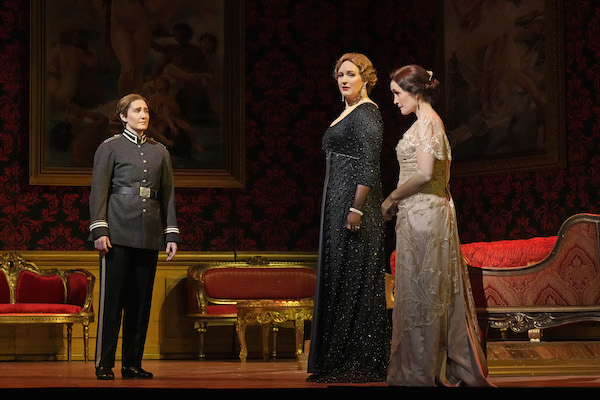Davidsen a stately, subtle Marschallin as Met’s “Rosenkavalier” returns

The Metropolitan Opera’s 2017 production of Der Rosenkavalier returned Monday night, with some familiar faces and some new ones in the principal roles. Robert Carsen’s staging was as lurid as ever, with its Act III pick-me-up in a bordello, featuring wriggling sex workers in place of the discreet barmaids of more traditional productions.
But it’s those new faces that are the reason for another review, so let’s not bury the lede: Lise Davidsen cut a splendid figure as the Marschallin, using her room-filling voice as a delicate instrument to explore the emotional nuances of Hugo von Hofmannsthal’s text in Richard Strauss’s setting, and keeping vocal power in reserve until the opera’s show-stopping final trio.
Samantha Hankey made a believably boyish Octavian, if more dutiful than ardent, and left a little high-and-dry in the later going by Strauss’s long-windedness, unaided by inartful blocking by Carsen and revival director Paula Suozzi. Trimming her rich mezzo-soprano to adolescent lightness and then a nasal whine when in disguise as “Mariandel,” Hankey made her points when it came to vocal characterization.
And now the familiars: Observing the tenth anniversary of her Met role debut as Sophie, Erin Morley remained charmingly convincing and vocally agile as the starstruck teenager who, by opera’s end, has seen the light about men’s misbehavior and is not shy about telling them so. (This indecisive Octavian will get about a week’s grace period after the final clinch, if he’s lucky.)
When the Carsen production debuted in 2017, Günther Groissböck made news by re-interpreting the bumbling, skirt-chasing old Baron Ochs as a younger, more threatening abuser of women. He was back Monday night, lurching and barking around the stage, his comical low notes sharpened to a menacing growl. It was, in its nasty way, a seasoned and vocally solid performance.
The problem with this role in general is that Hofmannsthal’s and Strauss’s opera was originally about Ochs, with his name in the title, and it still shows in the finished product. No character is onstage more than he, nor more propulsive to the action.
Now imagine Macbeth as nothing but a bloodthirsty tyrant who gets his comeuppance in the end, and you have the problem with this and many other Rosenkavalier productions: a one-dimensional Ochs. The viewer “gets” him in the first few minutes, then is stuck with him for three-and-a-half hours, not counting intermissions.
If Rosenkavalier is an opera about erotic desire as a fundamental feature of life, and how it makes people behave well or badly, then the character of Ochs, if played in the round with real feelings and motivations, has as much to say about that as the others do, if not more. Not to mention making the plot really move ahead instead of sputter and halt. But it seems that directors, Carsen very much included, rarely ask for that.
One perhaps shouldn’t expect otherwise from a director who, at opera’s end, has the nice kids making out on a Trumpian solid-gold bed in a whorehouse while the other characters, including an aristocratic lady who wouldn’t be caught dead in such a place, wander in and out without apparent motivation. It’s great spectacle, but weak drama. And without dramatic credibility, Rosenkavalier is reduced to its best bits, a song cycle in costume.
At least there was much to admire in the singing throughout the cast. Brian Mulligan made a forceful entrance as Sophie’s father Faninal, even if after that the satirical contrast between parental rage and bourgeois obsequiousness could have registered better.
Thomas Ebenstein and Katharine Goeldner skulked effectively as the blackmailers Valzacchi and Annina, the latter teasing memorably in the letter scene with Ochs.
Resplendent in a white suit, René Barbera delivered the Italian Singer’s love song with tight focus and just a touch of weepy Caruso parody, no doubt exactly as Strauss intended. Alexandra LoBianco was full-voiced and sympathetic as Sophie’s maid Marianna.
A stout-voiced Scott Conner restored order in Act III as the Police Commissioner, although he was more fun to watch reining in the chaos and firing questions than later, after the Marschallin befriended him and drew him into the miasma of the last scenes.
In a company in-joke, Tony Stevenson, who had previously appeared here as the Police Commissioner, performed with gusto in drag as the Innkeeper, or in this case Madam, of the bordello.
Singing and acting impeccably in their Met debuts were the two major-domos, the late-substituting Spencer Hamlin for the Marschallin and Corey Bix for Faninal.
The Met Chorus bravely embodied every role the production threw at them, from Ochs’s squalling children to the half-clad ladies of the night.
Although the Carsen version of Act II was performed amid two large artillery pieces, the big guns really came out for Act III’s climactic trio, which began in a swim of conflicting emotions for the Marschallin, Octavian and Sophie but rose to an overpowering fortissimo, bordering on shrill—more than was needed, really, but a natural reaction of singers with big instruments looking out at a vast house.
Supporting them in this and all else was the biggest instrument of all, the Met Orchestra, artfully led by Simone Young with close attention to all of Strauss’s atmospherics and sly commentary. If some leisurely tempos seemed to prolong the action unduly, the fault was mostly not in the pit, but in the stage director’s office.
The production will run through April 20. Met in HD in cinemas, 12 p.m. April 15. metopera.org.